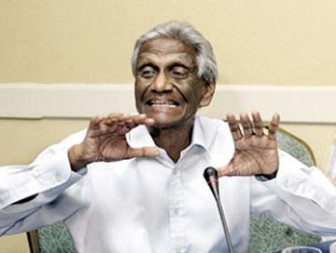Even as government announced last week that it had approved temporary licences to 12 unnamed persons to import chicken in an effort to ease a protracted shortage and stabilize prices on the local market, Head of the Caribbean Poultry Association (CPA) Dr Desmond Ali, has issued a call to Caricom countries to guard against the importation of “old meat” from the United States.
An announcement last week by Cabinet Secretary Dr Roger Luncheon that Cabinet had approved the granting of temporary licences for the importation of up to eight million pounds of chicken has triggered calls from industry players for the authorities to name the individuals or enterprises favoured by the administration with permits to import poultry meat.

The calls for disclosure come against the backdrop of views expressed by some in the poultry industry that the arrangement for short-term chicken imports is to favour friends of the political administration.
Acting Commerce Minister Irfaan Ali said last week that the 12 importers have been granted “a 50 per cent waiver on duty instead of the 60 per cent they requested”; a remark which observers say appears to suggest that the granting of the import licences was preceded by some formal request. However, industry sources have questioned whether the award of the licences had been preceded by the customary tender process, which they say ought to precede such awards. The government has so far declined to provide the names of the persons and/or entities granted licences.
Meanwhile, even as the local poultry industry fretted, CPA was warning Caricom countries to avoid the importation from the United States of what he described as “old meat” that would otherwise be utilized for the production of “cat food.” Speaking in Barbados last week, Dr Ali said Caribbean governments should take a stand against the importation of cheap poultry products of questionable quality from the US, failing which, he says, the region runs the risk of ruining a multi-billion-dollar industry.
Alluding to what he described as “a kind of inertia in the governments” the CPA head said the region appears to think “that the WTO agreements and economic Partnership Agreements, which we have signed, do not allow us the policy space to defend our industry.”
He said the region, with the exception of Belize and Guyana – is threatened by the importation of cheap residual chicken parts from the USA since American consumers favour chicken breasts and wings. “The other parts, the leg quarters and the backs and necks, what we call the dark meat, can be sold to a market at whatever price that market can afford,” Dr Ali said. He added that that the significant reduction in US chicken imports by Russia meant that the US was now eager to find alternative markets for what in some instances was “quite old” chicken meat “destined for pet meats.”
The CPA head says the region must follow the lead taken by Mexico and Canada by increasing import duties on leg quarters coming out of the USA.
Guyana has frequently been forced to resort to short-term chicken imports, particularly during the latter part of the year, to cater for shortages and price rises resulting from seasonal demand. This time around, according to Luncheon, there has been an increased demand for chicken among consumers in the country’s expanding gold-mining sector, which has led to the significant movement of locally produced supplies from the coast to the interior.
Government says the licences are temporary and will expire at the end of September. However, a Ministry of Agriculture source told this newspaper last week that during the latter months of the year “the likelihood of a shortage of chicken on the local market could be even greater” and “we cannot rule out further importation at least during the holiday period.”
By granting licences for chicken imports in a manner that has laid it open to charges of favouritism the government has added further controversy to an industry where it has been at odds with producers over the years.
Guyana’s estimated 5,000 poultry farmers – most of them small and medium-scale operators – have been known to complain about a lack of adequate support services to an industry which is periodically affected by fluctuating feed prices and high mortality rates.
In the latter half of 2010, the Ministry of Agriculture was sounding decidedly upbeat on the local poultry industry.
In September that year, at the request of this newspaper the ministry provided information to the effect that since 2000 Guyana had moved from being a net importer to becoming self-sufficient in poultry meat with production more than doubling from 11,769 metric tonnes to 27,068.7 metric tonnes in 2009. This performance, the ministry said, had led the local industry to begin to target a share of the US$350 million plus Caricom poultry market.
By the end of the second quarter of 2011, however, a ten per cent decline in poultry meat production appeared to have put the country’s export ambitions firmly on the back burner.
Since then, the extent of growth in the industry in the context of meeting that projected target has been unclear and the recent disclosure that interior consumption had significantly increas-ed demand appears to have further dashed export ambitions at least for the foreseeable future.








